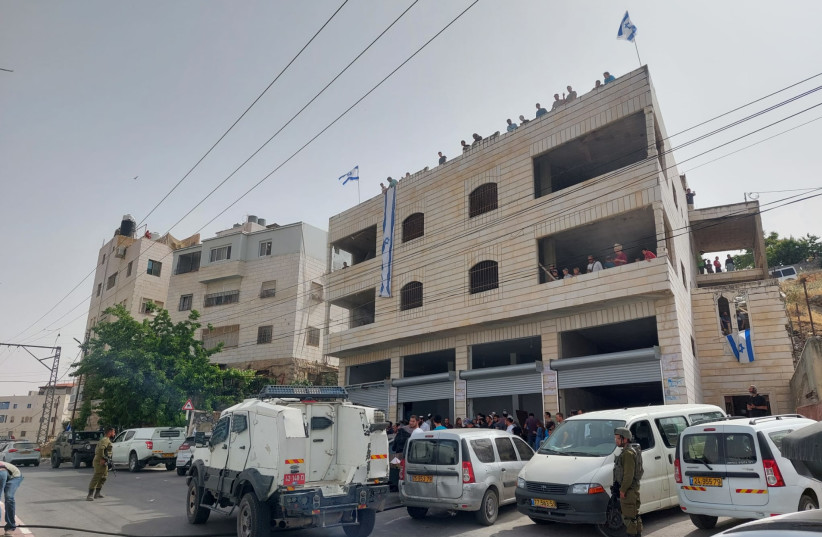The IDF has agreed to guard a new Jewish building in Hebron – called Beit Tekuma – until the Civil Administration signs off on the purchase agreement between the settlers and the former Palestinian owners.
In exchange for this agreement, 15 families that had moved into the building on Friday agreed to leave.
“This is what the building looks like when it’s free of Jews,” MK Orit Struck wrote on Twitter, where she posted a photograph of the three-story apartment building, whose name means “House of Rebirth.”
An Israeli flag still waved from the top of the structure and a blue and white sign with the words “Beit Tekuma” hung from its wall.
The Jewish group Harchevi – whose name is based on the Biblical verse in Isaiah, “enlarge the place of your tent” – claims to have purchased the building from its Palestinian owners but has yet to receive a purchase and entry agreement from the Civil Administration.

Beit Tekuma is located on the main Hebron road between the back gate of the Kiryat Arba settlement and the Beit HaShalom apartment building.
The purchase became public on Friday when 15 settler families moved into the building, but members of Hebron’s Jewish community had already been accessing the structure for over a month.
Harchevi said that the families moved in “on Thursday when it was clear to us that, upon learning that Jews had bought the building, Arabs [Palestinians] planned to break into it and hold it, even though we had legally purchased it.”
On Sunday, both the group and the families received support from the religious-Zionist party, including party head MK Bezalel Smotrich and Struck. Struck, who symbolically moved her office to the front of the building to thwart any moves to evacuate it, noted that there was “no legal basis” to do so.
She accused Defense Minister Benny Gantz (Blue and White) of misusing his power “to abuse” the settlers with the support of right-wing parties in the coalition – Yamina and New Hope.
Hundreds of male seminary students flocked to the building in solidarity and, at times, burst into song and dance on the street outside the structure.
The last building purchased by the Jewish community in Hebron was Beit Leah and Rachel in 2018. There are some 1,000 Jews living in the city of over 215,000 Palestinians. Jewish history in Hebron dates back to Abraham’s purchase of the Tomb of the Patriarchs, which is recorded in the Bible.
Beit Tekuma is located in a Palestinian neighborhood in a small section of Hebron, which is under Israeli military control.
The left-wing NGO Peace Now charged that the government had allowed settlers to set the country’s policies and it was time that it stopped “bowing to criminals.”
The Hebron Municipality said that the “The case is under investigation.”
The owner of the building, Mohammed Eid Ja’bari, denied selling it to the Jewish community, a move that the Palestinian Authority holds to be a criminal act punishable by jail time.
“This was my house for 32 years. I received many requests and offers to sell it. I refused to sell or even rent,” Ja’bari said.
“I recently tried to sell the building to my neighbor, from the Harhash family,” he added. “He was the only one who bought it. He said that he was even prepared to register the building under the ownership of the Islamic Wakf. But I stopped the deal after I saw some things that were not good. [...] I didn’t get all the money anyway. I only received a small sum as a down payment. I did not do a final transfer of ownership.”
According to Ja’bari, “the lawyer responsible for the transaction promised to keep all the documents in a safe place until we reach a final agreement – to continue the transaction or cancel it. Because the deal was never carried out, we later agreed to cancel it and that I would return the money I received.”
Abu Ali Harhash, whose name was mentioned as the buyer, confirmed that he had signed a contract to purchase the building about a month and a half ago.
He said that he bought the building for 500,000 Jordanian dinars. “I paid 200,000 Jordanian dinars and received the keys and started working on renovating the house,” he said, adding that the transaction was later canceled because of a “misunderstanding” with the owner. He also denied that he had received the documents concerning the house.
Harhash also strongly denied any involvement in the sale of the property to Jews. He said, “Two weeks ago, I informed my lawyer that I don’t want the property, that we are canceling the deal.”
Both Ja’bari and Harhash said that they don’t know how the property ended up being sold to a third party.
The building is 1,090 square meters and includes apartments and shops.
